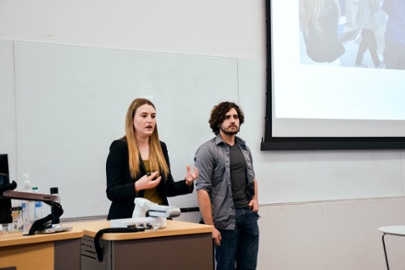
Innovative ideas and thoughtful presentations highlighted the Cheng Wu Innovation Challenge, a competition that encourages students to use technology in innovative ways to address compelling problems.
Students with a wide variety of academic backgrounds competed at Luddy Hall’s Dorsey Learning Hall on April 14. Each team had to have at least one Luddy School of Informatics, Computing and Engineering student.
After a morning full of presentations, a panel of judges recognized three student groups for their technological innovations.
Top prize was shared by Elevate and KLARE. They beat out six other teams to each earn $9,000 out of a total of $20,000 awarded. A third team, Tell Me Your Story, won $2,000.
Travis Brown, senior executive assistant dean of innovation, entrepreneurship and commercialization , said the Cheng Wu competition, “rewards students for doing the very thing the Luddy School was founded to do -- drive cutting-edge technology.”
Brown praised the teams’ preparedness and professionalism.

“Everyone was strong,” Brown said. “The finalists were especially strong. They did a great job of making their arguments and conveying why they deemed their technological concept to be innovative.”
One competition highlight was the increasing number of partnerships between students all over campus.
“That results in more viable businesses around technical innovation,” Brown said. “That’s something we’ve always strived for. We’re inspiring students from other disciplines to work with Luddy students.”
KLARE is a flamingo-shaped, child-friendly robot that works with a Bluetooth-based arm band to monitor child safety in swimming pools. Judges were impressed by the robot’s approachability, affordability and potential to save lives.
Team members were Human Computer Interaction design master’s students Lavanya Subramanian and Sampada Bhatnagar, and informatics major Sarayu Nandipati.
“This started as a class project,” Subramanian said. “It’s very rewarding to go out of class in this platform and impress real professionals and innovators.”
Subramanian added they will use the money to build a water-proof wrist band with multiple sensors that can communicate with the robot.

Elevate is a phone app that allows remote operation of elevators as well as monitors their performance for more efficient maintenance. Judges were impressed by the team’s extensive research, which included talking to Homeland Security.
Team members were Casey Curtis (senior majoring in entrepreneurship and corporation innovation at the Kelley School of Business), Derek Thach (majoring in informatics and marketing) and Matteo Vidali (master’s student in intelligence systems engineering).
“The original idea was to have a mobile app that can call an elevator with your phone from your classroom or apartment,” Curtis said. “Now that’s translated into analytics and doing predictive maintenance for the elevators.
“Elevators are built into such heavy infrastructure that they can’t be modernized. We’ve created something that can be implemented into that system that can modernize it at a fraction of the cost and (deliver) more data than they’ve ever had before.
Curtis said they’ll use the money to continue their prototyping. The current hardware is external on elevators. They want to create an internal version that can be integrated into the operating control panel.
Varun Pimplé, a second-year HCI/d student, received $2,000 for Tell Me Your Story, an app that allows users to access stories about an object or a location. The goal is to improve connectivity and reduce loneliness.
Other teams included:
akomiBot - Alejandro Murillo-González (Ph.D. student in Intelligent Systems Engineering). Creating a mobile robot that will help with everyday tasks.
ID Digitalization - Matt Gacek (B.S. in Computer Science). Using technology to streamline and enhance the process of digital identification.

LawBot - Anisha Bajaj (B.S. in Data Science), Ankush Pathak (B.S. in Computer Science), Paritosh Sabade (B.S. in Computer Science), and Shreyas Vaidya (M.S. in Data Science). Using Deep Learning and other techniques to simplify legal documents by highlighting and summarizing technical vocabulary.
SafeZonez - Arnav Parikh (B.S. in Intelligent Systems Engineering) and Samy Salama (B.S. in Computer Science). Using a mobile application to identify safe, sketchy and dangerous locations around a city or campus based on crime data.
Smart Watch Ensuring Safety and Security - Bhavya Mistry (B.S. in Computer Science), Jinay Panchal (M.S. in Computer Science) and Ronak Bhagchandani (M.S. in Computer Science). The watch alerts police if a user is in danger and allows police to track the user in real time.
Non-winning teams are eligible for future Cheng Wu competitions.
“I had multiple teams ask to meet with me to strengthen their pitches and develop their technology so they could participate next year,” Brown said. “You can tell they are committed.”
Judges were:
- Adam Russek-Sobol, Founder & CEO, CareBand
- Brian DeKemper, Account Executive, Amazon Web Services
- Donald F. Kuratko, Jack M. Gill Chair of Entrepreneurship, Professor of Entrepreneurship, and Executive Director of the Johnson Center for Entrepreneurship & Innovation, Kelley School of Business
- Ilya Rekhter, CEO, Megawatt & Ex DoubleMap Founder
- Selma Sabanovic, Associate Dean for Graduate Education, Associate Professor of Informatics, and Associate Professor of Cognitive Science, Luddy School of Informatics, Computing, and Engineering
- Stephen Moseson, Co-founder & CEO, Mosi Audio
The Cheng Wu Innovation Challenge was launched in 2016 as an opportunity for students to develop technological innovations without the constraint of building a business around their ideas. Luddy alumnus and serial entrepreneur Cheng Wu established the fund that sponsors the challenge.

